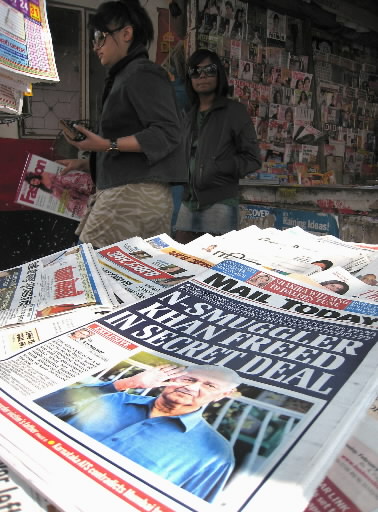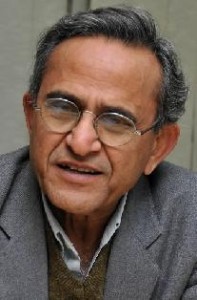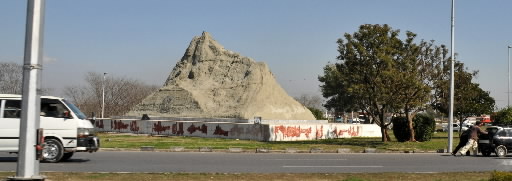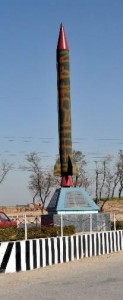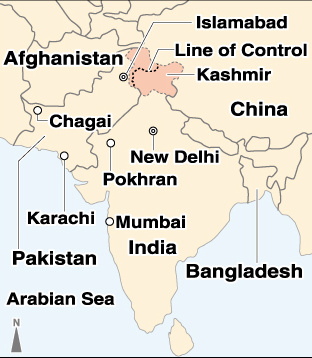Nuclear weapons can be eliminated: Chapter 2, Introduction
Apr. 5, 2009
Chapter 2: South Asia's cold war
Introduction: Pakistan seeks Japanese technology
by Junichiro Hayashi, Staff Writer
The black market has played a major part in Pakistan’s nuclear development. Materials essential for the manufacture of nuclear weapons were gathered from throughout the world and established technologies were sold to other countries. This illegal network also sought the latest technology from Japan. India developed nuclear weapons to address the threat posed by China. Pakistan was determined to acquire its own nuclear weapons to keep up with India. Looking back, the responsibility of the international community, which failed to halt the process, and of businesses, which regarded it as a business opportunity, is clear.
Japanese man seen at home of Khan
In Islamabad, the capital of Pakistan, I met physicist Abdul Nayyar, who told me he had seen a Japanese man at the guest house of Abdul Qadeer Khan, the Pakistani nuclear scientist widely regarded as the founder of Pakistan’s nuclear program. Mr. Nayyar, 64, a former university professor, is now a senior research fellow at a private research institute engaged in policy evaluation. He said he saw the Japanese man around 1987.
The existence of the black market in nuclear materials first came to light during a televised admission by Khan in 2004, so it was unknown when Mr. Nayyar saw the Japanese man. “There were always people selling scientific instruments staying in Khan’s guest house,” Mr. Nayyar said. “I’m sure there was fierce competition between the companies from Japan and those from the West.”
There are strict regulations regarding the import and export of certain materials, including parts for centrifuges used in the enrichment of uranium, electron microscopes used to determine the composition of metals. Mr. Nayyar was told by a friend who was involved in nuclear weapons development in the 1970s and 1980s, when Pakistan embarked on its nuclear development program, that in order to get around these regulations the labels were switched for those of equipment for which there were no restrictions and then the equipment was sold.
Another scientist in Islamabad who agreed to be interviewed off the record said, “The equipment was usually purchased at two to four times the regular price. I’m sure it was tough for the vendors to resist temptation.”
In 2004 Mohamed El-Baradei, director general of the International Atomic Energy Agency, said that more than 20 companies from around the world had illegally provided nuclear technology to Libya, Iran, and North Korea via the black market. “I don’t know whether or not the black market still exists, but in a capitalist world someone will sell nuclear materials to make money,” Mr. Nayyar said. “The black market can’t be eradicated by heavy penalties alone.”
After perfecting its own technology in the latter half of the 1980s, Pakistan became an exporting nation. U.S. newspapers and other news media reported suspicions that in exchange for uranium enrichment technology North Korea provided Pakistan with the technology for ballistic missiles that could be used to carry nuclear warheads.
The Pakistani government has denied involvement in the black market and said that Dr. Khan acted alone, but suspicions remain because of the involvement of the Customs Office, a government agency, in imports and exports.
On January 16 the Chugoku Shimbun sent six questions to Dr. Khan in which we asked about matters such as the black market’s involvement in nuclear terrorism and whether or not nuclear weapons can be abolished, but we have not received a reply.
Ongoing tensions between the two countries
According to the 2008 yearbook of the Stockholm International Peace Research Institute (SIPRI), India possesses between 60 and 70 nuclear warheads, while Pakistan has about 60.
In 1998 India conducted five nuclear tests and Pakistan conducted six. An Indian peace activist told me with a wry smile, “India conducted one test in 1974, so Pakistan matched them.” The two countries are believed to feel that they possess the same number of weapons.
India and Pakistan were originally part of the same country. They became separate nations in 1947 when the British Indian Empire gained independence and was partitioned into India and Pakistan. Two months later the first conflict between the two nations over possession of the Kashmir region began. That struggle has created a deep division between the two countries ever since.
India was the first of the two to develop nuclear weapons.
After its war with India in 1962, China successfully conducted a nuclear test in 1964. Ten years later India conducted its own nuclear test, describing it as a “peaceful nuclear explosion.” While proclaiming its support for the abolition of nuclear weapons and a ban on their use in addresses at the United Nations in 1988 and on other occasions, in 1998, perceiving continued threats from Pakistan and China, India resumed nuclear testing and declared itself a nuclear weapon state. But in 2003 India announced its nuclear doctrine in which it pledged no first use of nuclear weapons.
Meanwhile Dr. Khan, who had studied uranium enrichment technology and other technical processes in Europe, returned to Pakistan in 1975, the year following India’s first nuclear test. He procured technology and materials from the West and elsewhere via the black market, which he himself had created, and then proceeded to develop nuclear weapons.
In 1979 the Soviet Union invaded Afghanistan. Pakistan served as the base for the U.S. military operation opposing the Soviet Union, and it has been suggested that this was a factor behind the international community’s tacit approval of Pakistan’s nuclear weapons development.
Relations between India and Pakistan had been improving, and in recent years commercial flights between the two countries began. Last October, however, the U.S.-India Nuclear Agreement took effect, and relations between the two countries, which cooled following November’s terrorist attack in Mumbai, remain tense.
(Originally published on March 20, 2009)
Related articles
Japanese businessmen reveal trade deals with Pakistan's nuclear don (Feb. 25, 2009)
U.S. stopped Japan export of nuclear weapons equipment to Pakistan (Feb. 17, 2009)
Japanese firms played key role in Pakistan's nuclear program (Feb. 16, 2009)
To comment on this article, please click the link below. Comments will be moderated and posted in a timely fashion. Comments may also appear in the Chugoku Shimbun newspaper.

